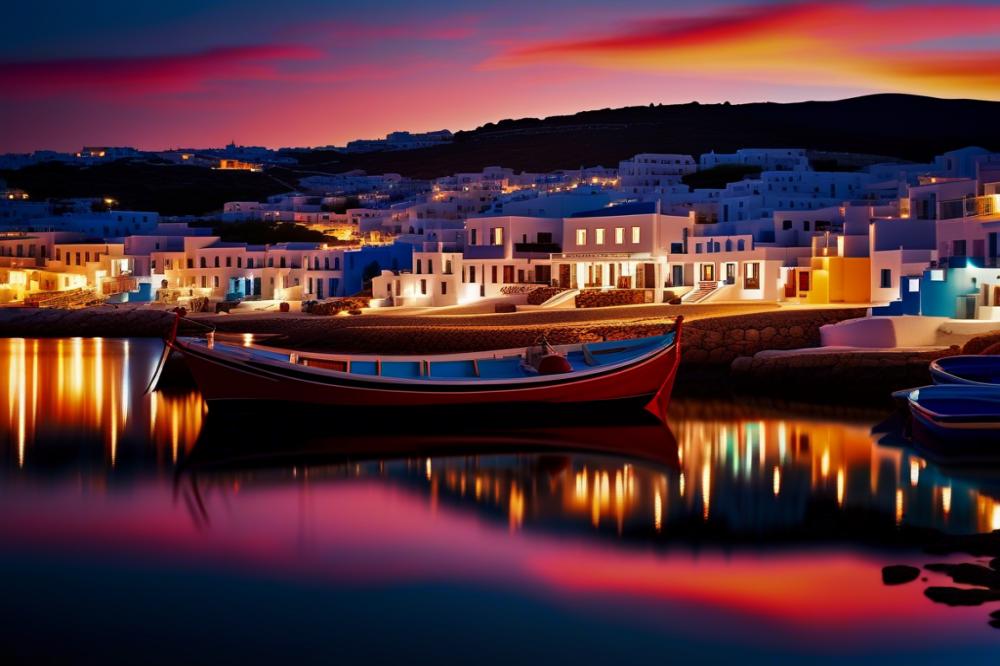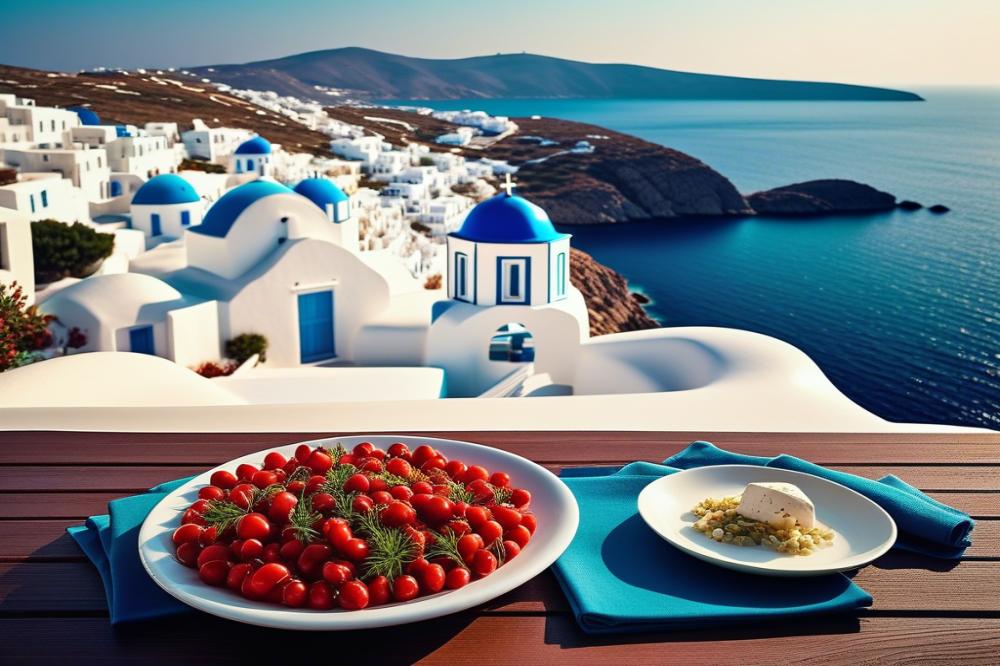Exploring Mykonos: A Culinary Paradise
Mykonos is not just a sun-soaked island known for its vibrant nightlife; it is also a culinary hub that offers a delightful experience for food lovers. The rich island culture captivates visitors, making it a hotspot for culinary tourism. fresh seafood plays a pivotal role in Mediterranean cuisine, drawing both locals and tourists alike. By sampling the dishes prepared with the day’s catch, travelers can taste the true essence of the sea.
The fishing villages dotting the coastline are alive with the sounds of local fishermen preparing for their day’s work. Each morning, boats return to shore with nets full of fish, shellfish, and other ocean delights. This dedication to sustainable fishing practices contributes to the preservation of marine life and ensures the quality of the seafood served in nearby seafood restaurants.
Diners can enjoy various traditional dishes that highlight the flavors of Mykonos seafood. Imagine sitting at a seaside taverna, savoring grilled octopus or fresh sardines, all while taking in the stunning coastal views. Each meal becomes a memorable dining experience, enhanced by the beautiful scenery and the warm local hospitality.
As you wander the charming streets of the island, the inviting aromas will draw you to open-air markets and quaint eateries. Mykonos not only celebrates its fishing heritage but also embraces a lifestyle centered around the ocean’s bounty. Eating fresh seafood in this enchanting setting is not just a meal; it’s a celebration of the island’s history and culture.
The fishing villages of Mykonos


Explore the charm of Mykonos’ fishing villages like Mykonos Town, Agios Ioannis, and Ornos. Each village offers its own character and beauty. Fishermen work daily in these coastal areas, bringing in fresh seafood that fuels the local economy and culinary scene. Vibrant boats sway softly in the harbor, creating a picturesque view against the stunning backdrop of the Aegean Sea.
In Mykonos Town, narrow alleys lead you to bustling seafood restaurants. Diners savor traditional dishes made from locally caught fish. The island culture is alive here, as chefs use recipes passed down through generations. You can taste the Mediterranean cuisine that defines this region. With fresh ingredients sourced daily, every meal becomes a remarkable dining experience.
Traveling to Agios Ioannis, the atmosphere shifts to a more serene vibe. This quiet village showcases breathtaking coastal views, where the sea meets the horizon. Local fishermen share stories of their trade, emphasizing sustainable fishing practices. Their respect for the ocean reflects their deep bond with the sea and its bounty. Visitors often enjoy watching the fishermen prepare for their long days at sea.
Ornos is another gem, popular with tourists seeking a laid-back vibe. The beach here offers a perfect spot for enjoying the sun, followed by a meal at a seaside taverna. Dining options abound, each featuring the freshest catch of the day. Travelers can indulge in various culinary tourism activities, sampling dishes that highlight the region’s rich flavors. Each meal tells a story of the island’s heritage.
Connecting with the local fishermen brings a deeper appreciation for their craft. The hard work and passion they put into their trade make every seafood dish special. In Mykonos, savoring a meal becomes more than just dining; it is an experience that ties you to the land and sea. Fishing villages here remind us of the delicate balance between nature and culture.
The Local Catch: Understanding Fresh Seafood


The fishing villages of Mykonos offer an impressive array of fresh seafood. Locals proudly present their daily catch, which can include snapper, octopus, and calamari. These flavorsome treasures come straight from the Aegean Sea, providing a true taste of the Mediterranean. Seafood restaurants dot the coastline, showcasing the best of local talents and offering fresh dishes that tantalize the palate.
Sustainable fishing practices are vital in this community. Local fishermen recognize the importance of preserving the rich marine life surrounding their homes. They carefully follow guidelines that protect fragile ecosystems. This method keeps fish populations healthy for future generations. Visitors can feel confident knowing their meal supports local traditions and environmental awareness.
The freshness of the seafood greatly enhances flavor. Fish caught hours before being cooked results in dishes that burst with taste. Traditional dishes, like grilled sardines drizzled with lemon, reflect the island culture and culinary heritage. Diners enjoy more than just food here; they partake in experiences that connect them to the vibrant history of the island.
Dining experiences often come with breathtaking coastal views. Sitting by the water, enjoying a plate of seafood pasta, creates a memorable moment. The combination of picturesque scenery and delicious flavors elevates each meal. Culinary tourism thrives in Mykonos, drawing people eager to explore unique and fresh offerings.
Must-Try Traditional Dishes


Exploring the fishing villages of Mykonos offers a delightful journey through the island’s culinary heritage. Fresh seafood plays a central role in local cuisine. Visitors can indulge in a variety of traditional dishes that highlight the skill of local fishermen and the abundance of the Mediterranean Sea.
One standout dish is grilled octopus. This delicacy is often marinated in olive oil, lemon, and herbs before being grilled to perfection. The result is a tender and smoky flavor that captures the essence of the island. Served with a side of fava beans or a refreshing Greek salad, grilled octopus is a staple in many seafood restaurants.
Another favorite is fried calamari. This dish features squid that has been lightly battered and deep-fried until golden brown. Crispy on the outside and tender on the inside, it is typically accompanied by a tangy dipping sauce. Many locals enjoy it as a meze, a small dish meant for sharing while enjoying coastal views with friends.
Seafood moussaka offers a unique twist on the traditional version. Instead of the usual meat, this dish layers fresh fish and vegetables with béchamel sauce and eggplant. Moussaka is baked until bubbly and golden, providing a satisfying meal that reflects the island culture. It is a perfect example of how Mediterranean cuisine adapts classic recipes to incorporate local ingredients.
These traditional dishes not only highlight the flavors of the region but also emphasize sustainable fishing practices. By choosing seafood sourced from local waters, diners support the fishing communities of Mykonos. Culinary tourism in the area thrives on these authentic dining experiences, making each meal a connection to the vibrant culture of the island. Savoring each bite reveals not just taste, but stories of the fishermen and their craft.
Dining Experiences: Seafood Restaurants and Coastal Taverns


The fishing villages of Mykonos are home to some of the island’s best seafood restaurants and coastal taverns. Visitors find a wide range of dining experiences that highlight the fresh seafood caught by local fishermen. Each establishment reflects the spirit of island culture in its own way. The atmosphere in these restaurants often feels relaxed and welcoming, making it easy for diners to savor each moment as much as the food.
One hidden gem is a charming tavern overlooking the Aegean Sea. Diners can enjoy stunning coastal views while tasting traditional dishes prepared with the freshest ingredients. Grilled octopus and fried calamari are favorites here. Every bite evokes a sense of true Mediterranean cuisine. Guests often stay to watch the sunset, creating a magical setting that enhances the culinary experience.
Popular seafood restaurants also embrace sustainable fishing practices. They source their ingredients from local waters, ensuring that the dishes serve both taste and responsibility. Such places tend to have a lively atmosphere. Customers laugh and share stories, creating a communal vibe that is part of the dining experience. A vibrant market atmosphere may accompany some restaurants, adding to the charm and local flavor.
Another spot worth mentioning is known for its traditional Greek meze. Here, a variety of small plates showcase the region’s rich culinary tourism. Patrons can sample everything from smoked fish to spicy shrimp. The menu changes regularly, reflecting the season’s best catches. This keeps every visit fresh and exciting.
Some coastal taverns have an even more casual vibe. Diners may sit outdoors under colorful umbrellas, enjoying a warm breeze as they sip on local wine. Simple yet delicious meals bring people together, emphasizing the shared love for good food and company. These dining experiences feel approachable and unpretentious, inviting everyone to join in the fun.
Exploring the fishing villages for food allows visitors to connect with the local community. Every meal tells a story, filled with flavors and traditions passed down through generations. It is about more than just eating; it is an immersion into the essence of Mykonos seafood and the life surrounding the sea.
Culinary Tourism: Savoring Mykonos Seafood
Culinary tourism plays a vital role in attracting visitors to the picturesque island of Mykonos. Travelers come to experience not just the stunning views, but also the rich flavors of Mediterranean cuisine. Fresh seafood is a highlight for many who visit. Dining experiences in this region are often unforgettable.
Food festivals showcase the best local dishes prepared by skilled chefs and local fishermen. These events celebrate the island’s culinary heritage and offer a taste of traditional dishes. Festivals create a vibrant atmosphere filled with music, laughter, and, of course, delicious food.
Cooking classes have become popular among tourists eager to learn the secrets of Mykonian gastronomy. Many classes are held in seaside venues, where the backdrop of coastal views enhances the experience. Participants get hands-on training in preparing local delicacies using sustainable fishing practices. Learning from chefs who have deep ties to island culture adds an authenticity that enhances every dish.
Seafood restaurants dot the coastline, each providing their twist on classic recipes. Visitors enjoy dining al fresco, often with the sound of waves accompanying their meals. Seafood enthusiasts appreciate the freshness of the catch, which changes daily based on local fishermen’s successes. Dining here is not just about the food; it’s an immersive experience in local life.
Overall, culinary tourism in Mykonos is more than satisfying hunger. It creates connections between travelers and the community. By savoring local flavors, visitors gain a deeper understanding of the island’s culture. The joy of tasting freshly prepared dishes enhances memories that last long after the trip ends.
Savoring Fresh Seafood in the Heart of Mykonos
Experiencing fresh seafood in the charming fishing villages of Mykonos offers a special connection to the local culture. Each meal tells a story of the sea and the hard work of the fishermen. Family-run tavernas serve dishes that showcase traditional Mediterranean cuisine. Diners can enjoy freshly caught fish, expertly prepared, while gazing at the beautiful harbor.
Eating a meal in this setting is more than just savoring flavors. It is about appreciating the dedication of those who catch the fish. Many locals prioritize sustainable practices, ensuring that their fishing methods protect the sea for future generations. This commitment fosters a sense of community and pride. Diners can feel this spirit in every bite.
Taste the difference when food is sourced from local waters. Flavors are vibrant and authentic, unlike anything available in a bigger city. Sharing a meal becomes a joyful experience, as laughter fills the air around small tables adorned with seafood. This communal dining creates memories, binding together visitors and locals.
Traveling to Mykonos for its gastronomic offerings is a journey for the senses. The sights, sounds, and tastes blend harmoniously. In the end, the appeal of savoring seafood here lies in more than just the food. It embodies tradition, culture, and a respect for the sea. That is what makes a visit to these villages truly unforgettable.



